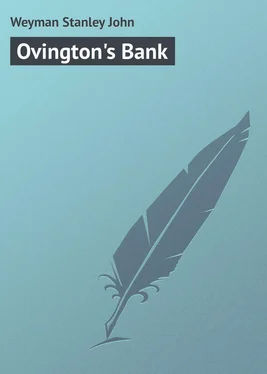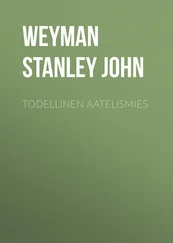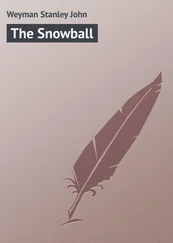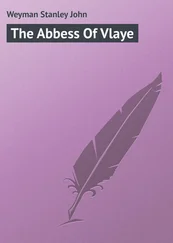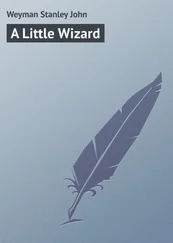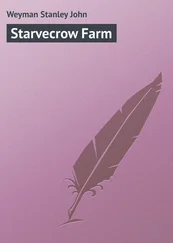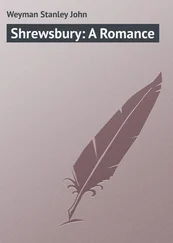Stanley Weyman - Ovington's Bank
Здесь есть возможность читать онлайн «Stanley Weyman - Ovington's Bank» — ознакомительный отрывок электронной книги совершенно бесплатно, а после прочтения отрывка купить полную версию. В некоторых случаях можно слушать аудио, скачать через торрент в формате fb2 и присутствует краткое содержание. Издательство: Иностранный паблик, Жанр: foreign_language, foreign_prose, на английском языке. Описание произведения, (предисловие) а так же отзывы посетителей доступны на портале библиотеки ЛибКат.
- Название:Ovington's Bank
- Автор:
- Издательство:Иностранный паблик
- Жанр:
- Год:неизвестен
- ISBN:нет данных
- Рейтинг книги:5 / 5. Голосов: 1
-
Избранное:Добавить в избранное
- Отзывы:
-
Ваша оценка:
- 100
- 1
- 2
- 3
- 4
- 5
Ovington's Bank: краткое содержание, описание и аннотация
Предлагаем к чтению аннотацию, описание, краткое содержание или предисловие (зависит от того, что написал сам автор книги «Ovington's Bank»). Если вы не нашли необходимую информацию о книге — напишите в комментариях, мы постараемся отыскать её.
Ovington's Bank — читать онлайн ознакомительный отрывок
Ниже представлен текст книги, разбитый по страницам. Система сохранения места последней прочитанной страницы, позволяет с удобством читать онлайн бесплатно книгу «Ovington's Bank», без необходимости каждый раз заново искать на чём Вы остановились. Поставьте закладку, и сможете в любой момент перейти на страницу, на которой закончили чтение.
Интервал:
Закладка:
For Arthur, ever since he had begun to attend at the bank, had been strangely silent. He had looked and smiled and teased her, had pressed her hand or touched her hair, but in sport rather than in earnest, meaning little. And she had been quick to see this, and with the womanly pride, of which, gentle and timid as she was, she had her share, she had schooled herself to accept the new situation. Now, her father had taken Arthur's suit for granted and humbled her. So Jos cried a little. But they were not very bitter tears.
CHAPTER V
Arthur was taken aback by his uncle's harshness, and he made haste to be at the bank early enough on the Monday to anticipate the banker's departure for Garth. He was certain that to approach the Squire at this moment in the matter of the railroad was to invite disaster, and he gave Ovington such an account of the quarrel as he thought would deter him from going over at present.
But the banker had a belief in himself which success and experience in the management of men had increased. He was convinced that self-interest was the spring which moved nine men out of ten, and though he admitted that the family quarrel was untimely, he did not agree that as between the Squire and a good bargain it would have weight.
"But I assure you, sir, he's like a bear with a sore head," Arthur urged.
"A bear will come to the honey if its head be sore," the banker answered, smiling.
"And perhaps upset the hive?"
Ovington laughed. "Not in this case, I think. And we must risk something. Time presses and he blocks the way. However, I'll let it stand over for a week and then I'll go alone. We must have your uncle."
Accordingly a week later, discarding the tilbury and smart man-servant that he had lately set up, he rode over to Garth, considering as he journeyed the man whom he was going to meet and of whom, in spite of his self-assurance, he stood in some awe.
Round Aldersbury were larger landowners and richer men than the Squire. But his family and his name were old, and by virtue of long possession he stood high among the gentry of the county. He had succeeded at twenty-two to a property neglected and loaded with debt, and his father's friends-this was far back in the old King's reign-had advised him to sell; let him keep the house and the home-farm and pay his debts with the rest. But pride of race was strong in him, he had seen that to sell was to lose the position which his forbears had held, and he had refused. Instead he had set himself to free the estate, and he had pared, he had pinched, he had almost starved himself and others. He had become a byword for parsimony. In the end, having benefited much by enclosures in the 'nineties, he had succeeded. But no sooner had he deposited in the bank the money to pay off the last charge than the loss of his only son had darkened his success. He had married again-he was by this time past middle age-but only a daughter had come of the marriage, and by that time to put shilling to shilling and acre to acre had become a habit of which he could not break himself, though he knew that only a woman would follow him at Garth.
Withal he was a great aristocrat, a Tory of the Tories, stern and unbending. Fear of France and of French doctrines and pride in his caste were in his blood. The Quarterly Review ranked with him after his Bible, and very little after it. Reform under the most moderate aspect was to him a shorter name for Revolution. He believed implicitly in his class, and did not believe in any other class. Manufacturers and traders he hated and distrusted, and of late jealousy had been added to hatred and distrust. The inclusion of such men in the magistracy, the elevation of Peel to the Ministry had made him fancy that there was something in the Queen's case after all; when Canning and Huskisson had also risen to power he had said that Lord Liverpool was aging and the Duke was no longer the man he had been.
He was narrow, choleric, proud, miserly; he had been known to carry an old log a hundred yards to add it to his wood-pile, and to travel a league to look for a lost sixpence. He dressed shabbily, which was not so much remarked now that dandies aped coachmen, as it had been in his younger days; and he rode about his fields on an old white mare which he was believed to hold in affection next after his estate and much before his daughter. He ruled his parish with a high hand. He had no mercy for poachers. But he was honest and he was just. The farmers must pay the wage he laid down-it was a shilling above the allowed rate. But the men must work it out, and woe betide the idle; they had best seek work abroad, and heaven help them if a foreign parish sent them home. In one thing he was before his time; he was resolved that no able-bodied man should share in the rates. The farmers growled, the laborers grumbled, there were hard cases. But he was obdurate-work your worth, or starve! And presently it began to be noticed that the parish was better off than its neighbors. He was a tyrant, but a just tyrant.
Such was the man whom Ovington was going to meet, and from whose avarice he hoped much. He had made his market of it once, for it was by playing on it that he had lured the Squire from Dean's, and so had gained one of his dearest triumphs over the old Aldersbury Bank.
His hopes would not have been lessened had he heard a dialogue which was at that moment proceeding in the stable-yard at Garth to an accompaniment of clattering pails and swishing besoms. "He've no bowels!" Thomas the groom declared with bitterness. "He be that hard and grasping he've no bowels for nobody!"
Old Fewtrell, the Squire's ancient bailiff, sniggered. "He'd none for you, Thomas," he said, "when you come back gallus drunk from Baschurch Fair. None of your Manchester tricks with me, says Squire, and, lord, how he did leather 'ee."
Thomas did not like the reminiscence. "What other be I saying!" he snarled. "He've no bowels even for his own flesh and blood! Did'ee ever watch him in church? Well, where be he a-looking? At his son's moniment as is at his elbow? Never see him, never see him, not once!"
"Well, I dunno as I 'ave, either," Fewtrell admitted.
"No, his eyes is allus on t'other side, a-counting up the Griffins before him, and filling himself up wi' pride."
"Dunno as I couldn't see it another way," said the bailiff thoughtfully.
"What other way? Never to look at his own son's moniment?"
"Well, mebbe-"
"Mebbe?" Thomas cried with scorn. "Look at his darter! He ain't but one, and he be swilling o' money! Do he make much of her, James Fewtrell? And titivate her, and pull her ears bytimes same as you with your grand-darters? And get her a horse as you might call a horse? You know he don't. If she's not quick, it's a nod and be damned, same as to you and me!"
Old Fewtrell considered. "Not right out the same," he decided.
"Right out, I say. You've been with him all your life. You've never knowed no other and you're getting old, and Calamity, he be old too, and may put up with it. But I don't starve for no Squire, and I'm for more wage. I was in Aldersbury Saturday and wages is up and more work than men! While here I'm a-toiling for what you got twenty year ago. But not me! I bin to Manchester. And so I'm going to tell Squire."
The bailiff grinned. "Mebbe he'll take a stick same as before."
"He'd best not!" Thomas said, with an ugly look. "He'd best take care, or-"
"Whist! Whist! lad. You be playing for trouble. Here be Squire."
The Squire glared at them, but he did not stop. He stalked into the house and, passing through it, went out by the front door. He intended to turn right-handed, and enter the high-terraced garden facing south, in which he was wont to take, even in winter, a few turns of a morning. But something caught his eye, and he paused. "Who's this?" he muttered, and shading his eyes made out a moment later that the stranger was Ovington. A visit from him was rare enough to be a portent, and the figure of his bank balance passed through the Squire's mind. Had he been rash? Ovington's was a new concern; was anything wrong? Then another idea, hardly more welcome, occurred to him: had the banker come on his nephew's account?
Читать дальшеИнтервал:
Закладка:
Похожие книги на «Ovington's Bank»
Представляем Вашему вниманию похожие книги на «Ovington's Bank» списком для выбора. Мы отобрали схожую по названию и смыслу литературу в надежде предоставить читателям больше вариантов отыскать новые, интересные, ещё непрочитанные произведения.
Обсуждение, отзывы о книге «Ovington's Bank» и просто собственные мнения читателей. Оставьте ваши комментарии, напишите, что Вы думаете о произведении, его смысле или главных героях. Укажите что конкретно понравилось, а что нет, и почему Вы так считаете.
